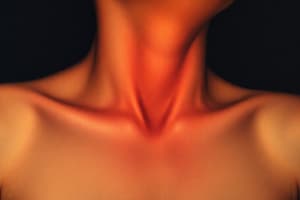Podcast
Questions and Answers
Which symptom is most commonly associated with hypothyroidism?
Which symptom is most commonly associated with hypothyroidism?
- Excessive sweating
- Increased heart rate
- Fatigue (correct)
- Weight loss
What is a primary characteristic of autoimmune thyroid disorders?
What is a primary characteristic of autoimmune thyroid disorders?
- Increased production of calcitonin
- Enhanced secretion of insulin
- Destruction of thyroid tissue (correct)
- Decreased levels of parathyroid hormone
What is the most likely cause of hyperthyroidism?
What is the most likely cause of hyperthyroidism?
- Excessive parathyroid hormone secretion
- Increased glucagon levels
- Low levels of thyroxine
- Overproduction of thyroid hormones (correct)
Which hormone is primarily responsible for increasing blood glucose levels?
Which hormone is primarily responsible for increasing blood glucose levels?
What is the role of parathyroid hormone in calcium homeostasis?
What is the role of parathyroid hormone in calcium homeostasis?
Which adrenal hormone is responsible for sodium retention and potassium loss?
Which adrenal hormone is responsible for sodium retention and potassium loss?
What regulates the secretion of aldosterone?
What regulates the secretion of aldosterone?
Which cell type in the pancreas secretes insulin?
Which cell type in the pancreas secretes insulin?
What symptom is commonly associated with hypothyroidism?
What symptom is commonly associated with hypothyroidism?
Which of the following is an autoimmune disorder that leads to hyperthyroidism?
Which of the following is an autoimmune disorder that leads to hyperthyroidism?
Which condition is characterized by excessive thyroid hormone production?
Which condition is characterized by excessive thyroid hormone production?
Which of the following can result from the presence of antibodies against specific receptors?
Which of the following can result from the presence of antibodies against specific receptors?
What is the primary cause of congenital hypothyroidism?
What is the primary cause of congenital hypothyroidism?
What leads to hyperglycemia during the 'fight or flight' response?
What leads to hyperglycemia during the 'fight or flight' response?
What symptom is NOT typically associated with hyperthyroidism?
What symptom is NOT typically associated with hyperthyroidism?
Which endocrine disorder can arise from inadequate synthesis of second messengers?
Which endocrine disorder can arise from inadequate synthesis of second messengers?
Which of the following is NOT an acute complication of Diabetes Mellitus?
Which of the following is NOT an acute complication of Diabetes Mellitus?
What is a key characteristic of Diabetic Ketoacidosis (DKA)?
What is a key characteristic of Diabetic Ketoacidosis (DKA)?
Which symptom is typically associated with Diabetic Ketoacidosis?
Which symptom is typically associated with Diabetic Ketoacidosis?
Which hormone plays a critical role in increasing blood glucose levels?
Which hormone plays a critical role in increasing blood glucose levels?
Which of the following is a microvascular complication of diabetes?
Which of the following is a microvascular complication of diabetes?
What is a common consequence of osmotic diuresis in Diabetic Ketoacidosis?
What is a common consequence of osmotic diuresis in Diabetic Ketoacidosis?
What complication can arise from impaired kidney function due to diabetes?
What complication can arise from impaired kidney function due to diabetes?
Which condition would most likely lead to poor wound healing in diabetic patients?
Which condition would most likely lead to poor wound healing in diabetic patients?
Flashcards
Thyroid Hormones
Thyroid Hormones
Affect tissue growth, cell metabolism, heat production, and oxygen consumption.
Parathyroid Hormone (PTH)
Parathyroid Hormone (PTH)
Increases blood calcium and decreases blood phosphate levels. Antagonistic to calcitonin.
Insulin
Insulin
Anabolic hormone that allows glucose to enter cells, promoting protein, lipid, and nucleic acid synthesis.
Glucagon
Glucagon
Signup and view all the flashcards
Glucocorticoids
Glucocorticoids
Signup and view all the flashcards
Mineralocorticoids
Mineralocorticoids
Signup and view all the flashcards
Epinephrine/Norepinephrine
Epinephrine/Norepinephrine
Signup and view all the flashcards
Pancreatic Hormones
Pancreatic Hormones
Signup and view all the flashcards
Counter-regulatory hormones
Counter-regulatory hormones
Signup and view all the flashcards
Diabetic Ketoacidosis (DKA)
Diabetic Ketoacidosis (DKA)
Signup and view all the flashcards
Microvascular disease
Microvascular disease
Signup and view all the flashcards
Diabetic Retinopathy
Diabetic Retinopathy
Signup and view all the flashcards
Macrovascular disease
Macrovascular disease
Signup and view all the flashcards
Hyperglycemia
Hyperglycemia
Signup and view all the flashcards
Electrolyte imbalances
Electrolyte imbalances
Signup and view all the flashcards
Hypoglycemia
Hypoglycemia
Signup and view all the flashcards
Fight or Flight Response
Fight or Flight Response
Signup and view all the flashcards
Graves' Disease
Graves' Disease
Signup and view all the flashcards
Pretibial Myxedema
Pretibial Myxedema
Signup and view all the flashcards
Hypothyroidism
Hypothyroidism
Signup and view all the flashcards
Hashimoto's Disease
Hashimoto's Disease
Signup and view all the flashcards
Congenital Hypothyroidism
Congenital Hypothyroidism
Signup and view all the flashcards
Maternal T4
Maternal T4
Signup and view all the flashcards
Study Notes
Hormonal Regulation
- Hormonal regulation is a complex process maintaining the body's internal environment.
- The endocrine system utilizes glands secreting hormones into the circulatory system.
- Hormones are chemical messengers regulating various bodily functions.
- Hormone release is controlled via negative feedback mechanisms.
Hormone Transport and Action
- Hormones can be transported in free or bound forms (to a carrier).
- Water-soluble hormones (epinephrine, norepinephrine, amino acids) circulate unbound.
- Lipid-soluble hormones (steroids, thyroid hormones) primarily circulate bound to proteins.
- Hormones bind to receptors within target cells, initiating intracellular cascades.
- Receptor location is determined by the hormone's solubility.
The Hypothalamic-Pituitary Axis
- The hypothalamic-pituitary axis is central to hormonal regulation.
- The hypothalamus, in the brain, controls the endocrine system by releasing hormones regulating the pituitary gland's function.
- The pituitary then regulates other endocrine glands.
Thyroid and Parathyroid Glands
- Thyroid gland: Produces thyroxine (T4) and triiodothyronine (T3).
- Thyroid hormone secretion is regulated by the hypothalamic-pituitary axis.
- Thyroxine (T3) and triiodothyronine (T4) regulate growth, maturation, cell metabolism, heat production, and oxygen consumption.
- Parathyroid glands: Produce parathyroid hormone (PTH).
- PTH regulates calcium homeostasis.
- PTH acts as an antagonist to calcitonin.
Pancreas
- Pancreas is both an endocrine and exocrine gland.
- Endocrine function is in islets of Langerhans.
- Alpha cells: secrete glucagon.
- Beta cells: secrete insulin and amylin.
- Delta cells: secrete somatostatin and gastrin.
- F cells: secrete pancreatic polypeptide.
- Insulin facilitates glucose uptake, promotes protein, lipid, and nucleic acid synthesis.
- Amylin delays nutrient uptake and suppresses glucagon secretion.
Adrenal Glands
- Adrenal glands are located above the kidneys, composed of cortex and medulla.
- Cortex produces glucocorticoids (e.g., cortisol) and mineralocorticoids (e.g., aldosterone).
- Medulla secretes catecholamines (epinephrine, norepinephrine).
- Adrenal hormones affect carbohydrate metabolism, anti-inflammatory effects, and regulating sodium/potassium balance.
Alterations in Hormonal Regulation
- Endocrine disorders arise from feedback system failure, glandular dysfunction, or secretory cell defects.
- Target cell dysfunction can be caused by reduced receptors, impaired receptor function, or abnormal receptor expression.
- Intracellular disorders disrupt hormone action in subsequent pathways (e.g., receptor signaling cascades).
Graves' Disease
- An autoimmune disorder characterized by overproduction of thyroid hormones (T3 and T4).
- Antibodies mimic the action of TSH, leading to hyperthyroidism.
- Clinical presentations include bulging eyes, fluid accumulation under the skin (particularly shins), jitteriness, rapid heartbeat.
Myxedema
- A severe form of hypothyroidism, often associated with prolonged, untreated hypothyroidism.
- Characterized by altered dermis composition (non-pitting edema), puffy skin, altered consciousness, and potential cardiovascular complications.
Diabetes Mellitus
- A chronic metabolic disorder characterized by hyperglycemia.
- Results from defects in insulin secretion, action, or both, affecting glucose metabolism.
- Insulin, produced by beta cells in the pancreas, facilitates glucose transport into cells.
Complications of Diabetes Mellitus
- Acute complications: hypoglycemia, diabetic ketoacidosis (DKA), hyperosmolar hyperglycemic syndrome (HHS)
- Chronic complications: microvascular disease (retinopathy, nephropathy, neuropathy), macrovascular disease (cardiovascular disease, stroke, peripheral vascular disease).
Diagnosing Diabetes Mellitus
- Diagnoses include fasting blood glucose test, random blood glucose test, and oral glucose tolerance test.
- Hemoglobin A1C test monitors long-term blood sugar control.
Studying That Suits You
Use AI to generate personalized quizzes and flashcards to suit your learning preferences.




